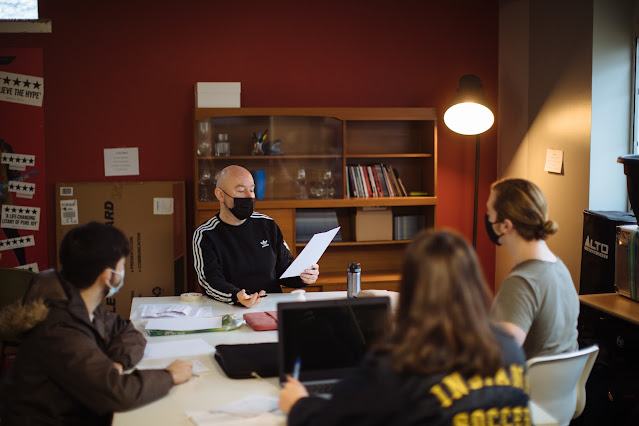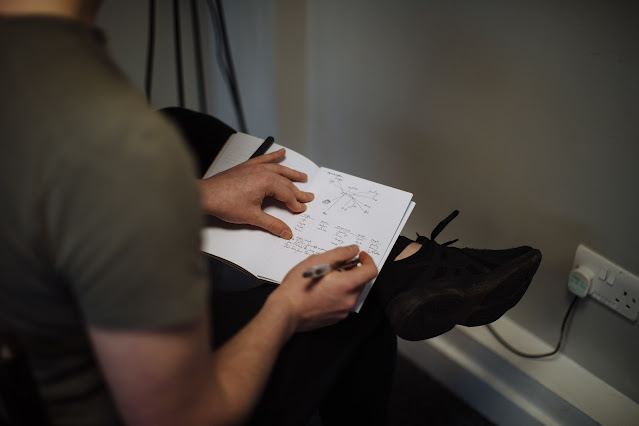Meet the mentors: Martin O'Connor
For their latest project, Press 2 For Help, the Citizens Theatre Young Co. have been working with professional playwrights on a series of theatrical shorts. The varied pieces all share the common thread of exploring mental health issues faced by young people.
In this blog series we're chatting to the writing mentors on the project and learning more about their creative process. First up, it's Martin O'Connor:
Can you tell us a little bit about yourself and your own journey into writing?
I have been working in theatre for around 20 years now – can’t believe I’m actually saying that! I work mostly as a writer, although I sometimes direct and sometimes I perform my own work. I’m interested in biography and verbatim, Scots and Gaelic. I do a bit of everything from spoken word to opera to youth work to anything else that takes my interest.
I started as an actor and my first taste of live performance and devising was at the Citizens Theatre, as part of a summer school youth project. I was 15. We worked with David O’Neill and Annie Wood on the play Tuesday by Edward Bond and some new material exploring the main themes of the play. This was long before theatre venues had departments dedicated to education and participation. This was the first time I really understood what performance could be. It was a major moment for me. Then I was lucky enough to be cast in a few Citizens shows after that and had the honour of working with Giles Havergal amongst others. The Citz has a special place in my heart, and I’ve had some of the best experiences there. I worked with TAG back in the day; one of the first pieces I had written – Changes with Grant Smeaton – was staged in the Circle Studio. So it feels good to back working at the Citz again with the Young Company.
What's it been like collaborating with the Young Co on the Press 2 For Help project?
My work is always people centric. Even if I’m doing a traditional writing commission or something for a main stage, I feel I always need to have a biographical element to it. Not just because it gives people a chance to be involved, but because I enjoy having conversations with people. Learning from personal experience, and either supporting them in the telling of their own story or weaving it in with my own writing giving an equal platform to both voices. So, for me the most enjoyable part was learning from the group and hearing about what is important to them and the direction they want to take their work.
As I mentioned before I’ve been doing this for a long time and even though I still feel young, I am aware that the gap between our generations is widening all the time. And therefore, our experiences are vastly different too. I didn’t grow up with social media, with information on demand, with the very specific and significant pressures that young people face. The arts world is also unrecognisable from my own youth and training. So, it’s important to acknowledge these pressures and not to make work with young people that fits your view, of what you think they should be saying, feeling, telling. My job is to create a space where creativity can happen. I’m not expert in their own lives but I can provide certain frameworks and structures that support their ideas.
Did you use any particular processes or tools when working with Young Co on developing the work?The first thing I wanted to do with the writers was to tease out the language of mental health. Very often we talk about this theme in very broad terms, but what does each individual story look like? What is the personal experience? For example, are we talking about depression, anxiety, or stress? Do we discuss medication or health systems? Is this brought about by external pressures, or is it internal, biological, or hormonal? These are all really important questions to get to the specifics of what we mean when we use given terms. I sent each writer a link to a website that deals with different aspects of treating conditions associated with poor mental health. From there we chose to explore certain aspects and it was then when we discussed styles of writing and performance.
Some of the writers chose character-based narratives, and some chose non-linear writing. From there they started creating monologues and spoken word poetry. I shared some monologues so that we could look at structure and perspective, and the specific artform of a monologue. We did a long spoken word exercise, looking at different visual stimuli and prompts as well as looking at lots of examples of poetry.
Do you feel Covid has impacted or changed the way you create new work?
The restrictions and the act of moving online certainly impacted on how I make work. Suddenly, we were in separate places, and making work in a group felt very different. However, with many of the people I worked with, we adapted to suit and found some new ways of working that were really interesting. For example, we looked at how separate writing and performing could sit together as a whole. What does a community look like when they are not together? It also forced us to look at other methods of presenting work such as creating sound pieces for download rather than public facing performance. I also wrote my very first radio play during the first lockdown, which I don’t think would have happened if live performances were still the norm.
What can audiences expect from Press 2 For Help?
They can expect to be challenged – not only by the themes but by the diverse styles of writing and approaches. I think we often pigeon-hole writing by non-artists and by young people, but I hope that audiences will be surprised at the quality of these pieces and perhaps some minds will be changed about what young people are capable of.
The Young Co. are showcasing their dramatic shorts on the 25th & 26th March. Book your tickets via our website and join us for a thought-provoking and entertaining evening of new writing.
Photos by Jassy Earl.




Comments